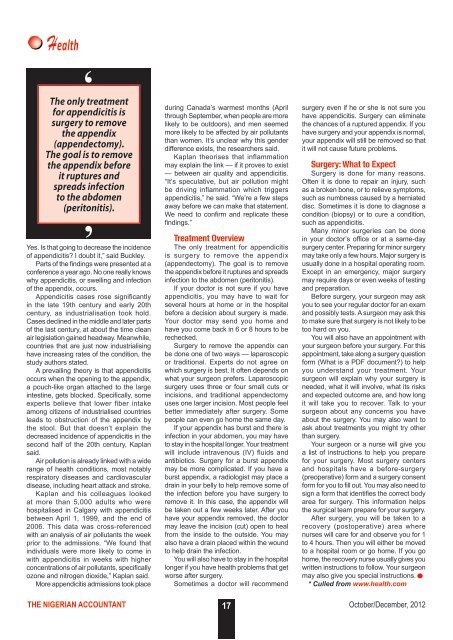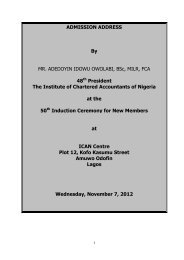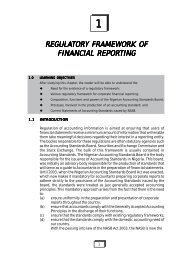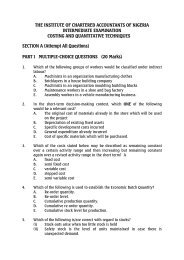The Nigerian Accountant 2012 October/December Edition
The Nigerian Accountant 2012 October/December Edition
The Nigerian Accountant 2012 October/December Edition
You also want an ePaper? Increase the reach of your titles
YUMPU automatically turns print PDFs into web optimized ePapers that Google loves.
Health‘<strong>The</strong> only treatmentfor appendicitis issurgery to removethe appendix(appendectomy).<strong>The</strong> goal is to removethe appendix beforeit ruptures andspreads infectionto the abdomen(peritonitis).‘Yes. Is that going to decrease the incidenceof appendicitis? I doubt it,” said Buckley.Parts of the findings were presented at aconference a year ago. No one really knowswhy appendicitis, or swelling and infectionof the appendix, occurs.Appendicitis cases rose significantlyin the late 19th century and early 20thcentury, as industrialisation took hold.Cases declined in the middle and later partsof the last century, at about the time cleanair legislation gained headway. Meanwhile,countries that are just now industrialisinghave increasing rates of the condition, thestudy authors stated.A prevailing theory is that appendicitisoccurs when the opening to the appendix,a pouch-like organ attached to the largeintestine, gets blocked. Specifically, someexperts believe that lower fiber intakeamong citizens of industrialised countriesleads to obstruction of the appendix bythe stool. But that doesn’t explain thedecreased incidence of appendicitis in thesecond half of the 20th century, Kaplansaid.Air pollution is already linked with a widerange of health conditions, most notablyrespiratory diseases and cardiovasculardisease, including heart attack and stroke.Kaplan and his colleagues lookedat more than 5,000 adults who werehospitalised in Calgary with appendicitisbetween April 1, 1999, and the end of2006. This data was cross-referencedwith an analysis of air pollutants the weekprior to the admissions. “We found thatindividuals were more likely to come inwith appendicitis in weeks with higherconcentrations of air pollutants, specificallyozone and nitrogen dioxide,” Kaplan said.More appendicitis admissions took placeduring Canada’s warmest months (Aprilthrough September, when people are morelikely to be outdoors), and men seemedmore likely to be affected by air pollutantsthan women. It’s unclear why this genderdifference exists, the researchers said.Kaplan theorises that inflammationmay explain the link — if it proves to exist— between air quality and appendicitis.“It’s speculative, but air pollution mightbe driving inflammation which triggersappendicitis,” he said. “We’re a few stepsaway before we can make that statement.We need to confirm and replicate thesefindings.”Treatment Overview<strong>The</strong> only treatment for appendicitisis surgery to remove the appendix(appendectomy). <strong>The</strong> goal is to removethe appendix before it ruptures and spreadsinfection to the abdomen (peritonitis).If your doctor is not sure if you haveappendicitis, you may have to wait forseveral hours at home or in the hospitalbefore a decision about surgery is made.Your doctor may send you home andhave you come back in 6 or 8 hours to berechecked.Surgery to remove the appendix canbe done one of two ways — laparoscopicor traditional. Experts do not agree onwhich surgery is best. It often depends onwhat your surgeon prefers. Laparoscopicsurgery uses three or four small cuts orincisions, and traditional appendectomyuses one larger incision. Most people feelbetter immediately after surgery. Somepeople can even go home the same day.If your appendix has burst and there isinfection in your abdomen, you may haveto stay in the hospital longer. Your treatmentwill include intravenous (IV) fluids andantibiotics. Surgery for a burst appendixmay be more complicated. If you have aburst appendix, a radiologist may place adrain in your belly to help remove some ofthe infection before you have surgery toremove it. In this case, the appendix willbe taken out a few weeks later. After youhave your appendix removed, the doctormay leave the incision (cut) open to healfrom the inside to the outside. You mayalso have a drain placed within the woundto help drain the infection.You will also have to stay in the hospitallonger if you have health problems that getworse after surgery.Sometimes a doctor will recommendsurgery even if he or she is not sure youhave appendicitis. Surgery can eliminatethe chances of a ruptured appendix. If youhave surgery and your appendix is normal,your appendix will still be removed so thatit will not cause future problems.Surgery: What to ExpectSurgery is done for many reasons.Often it is done to repair an injury, suchas a broken bone, or to relieve symptoms,such as numbness caused by a herniateddisc. Sometimes it is done to diagnose acondition (biopsy) or to cure a condition,such as appendicitis.Many minor surgeries can be donein your doctor’s office or at a same-daysurgery center. Preparing for minor surgerymay take only a few hours. Major surgery isusually done in a hospital operating room.Except in an emergency, major surgerymay require days or even weeks of testingand preparation.Before surgery, your surgeon may askyou to see your regular doctor for an examand possibly tests. A surgeon may ask thisto make sure that surgery is not likely to betoo hard on you.You will also have an appointment withyour surgeon before your surgery. For thisappointment, take along a surgery questionform (What is a PDF document?) to helpyou understand your treatment. Yoursurgeon will explain why your surgery isneeded, what it will involve, what its risksand expected outcome are, and how longit will take you to recover. Talk to yoursurgeon about any concerns you haveabout the surgery. You may also want toask about treatments you might try otherthan surgery.Your surgeon or a nurse will give youa list of instructions to help you preparefor your surgery. Most surgery centersand hospitals have a before-surgery(preoperative) form and a surgery consentform for you to fill out. You may also need tosign a form that identifies the correct bodyarea for surgery. This information helpsthe surgical team prepare for your surgery.After surgery, you will be taken to arecovery (postoperative) area wherenurses will care for and observe you for 1to 4 hours. <strong>The</strong>n you will either be movedto a hospital room or go home. If you gohome, the recovery nurse usually gives youwritten instructions to follow. Your surgeonmay also give you special instructions.* Culled from www.health.comTHE NIGERIAN ACCOUNTANT 17<strong>October</strong>/<strong>December</strong>, <strong>2012</strong>
















